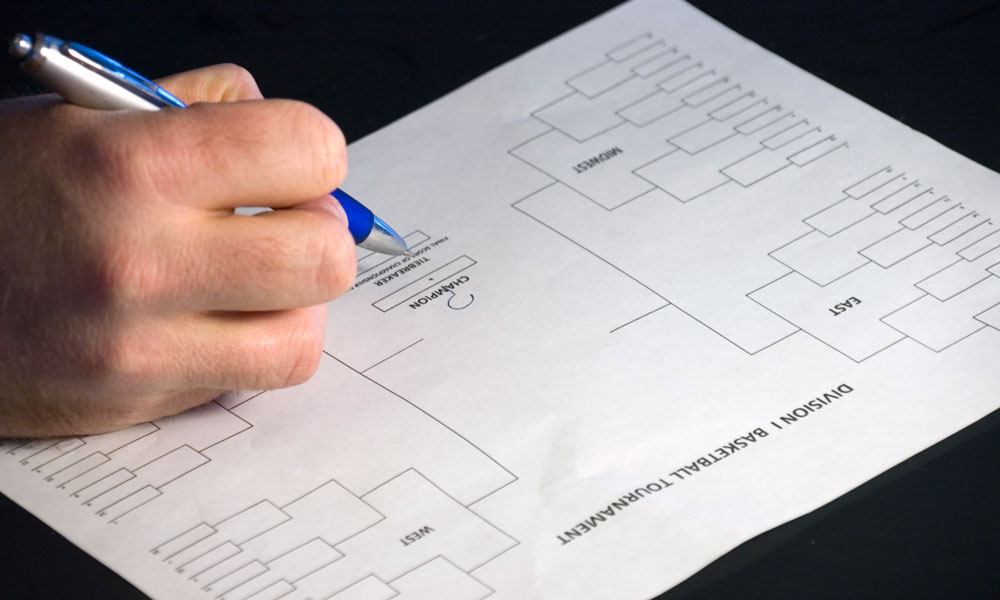
Embrace the (March) Madness And Other Productivity Tips
The NCAA Tournament is upon us, and while many reports cite the potential for lost productivity at work, some are claiming just the opposite. Plus, a few other tips to help boost productivity.
Many Americans are likely taking part in office pools or sneaking in a basketball game or two while at work during this year’s NCAA Tournament.
Both those activities could result in almost $2 billion in lost productivity for U.S. businesses, according to outplacement consulting firm Challenger, Gray, and Christmas, Inc.’s annual March Madness Report [PDF].
But, similar to the hype around the tournament itself, news of lost productivity during March Madness has become somewhat of an annual tradition, and some people are over it.
“This yearly ritual is a little overblown,” The Washington Post’s Jena McGregor wrote in a column last week. In her column, McGregor pointed to additional research that illustrates a smaller effect on productivity than is touted by the Challenger findings. For example, a survey of senior office managers last year found that only 11 percent thought that employee participation in office pools or watching games at work had a negative impact on workplace productivity.
Meanwhile, 27 percent of managers reported March Madness activities have a positive impact on productivity, and 32 percent reported they have a positive impact on employee morale.
This yearly ritual is a little overblown.
Even Challenger, Gray, and Christmas, Inc., advises companies to avoid putting the kibosh on March Madness activities at work.
“Any attempt to do so would most likely result in long-term damage to employee morale, loyalty, and engagement that would far outweigh any short-term benefit to productivity,” the firm noted in its report. “If anything, employers should embrace March Madness and seek ways to use it as a tool to boost employee morale and engagement.”
Ultimately, given the flexibility that technology allows today’s employees, it’s harder to define when people are working or not working, McGregor argued. Thus, it’s harder to calculate how much a few minutes of non-work-related activity in the office is affecting overall productivity.
“Many of the people taking time to fill out their office bracket or surreptitiously catch the last two minutes of a game while at work are also answering email while they sit on their couches at home,” McGregor wrote. “Worrying about how much productivity is lost a few weeks every spring ignores how much productivity is gained when employees do work while watching sports at home the rest of the year. So let’s cool it a little on the March Madness productivity panic.”
Outside of March Madness, here are a few other tips and resources that can help increase productivity year round:
Go zen. Take a note from several U.S. organizations that have adopted mindfulness programs to help boost employee productivity.
As part of a culture shift at health insurance company Aetna, for example, the organization recently started offering free yoga and meditation classes to its 50,000 employees. Of the more than 13,000 employees who’ve taken one of the classes, they are, on average, reporting a 28 percent reduction in stress, a 20 percent improvement in sleep quality, and an average of a 62-minute boost in productivity every week, according to The New York Times. Aetna estimates that extra hour of gained productivity is worth $3,000 per employee per year.
Drop the routine. If you’re a night owl, try doing creative tasks in the morning, and if you’re a morning person, tackle creative jobs in the evening. This is according to research that found students were better at solving riddles, or insight-based questions, when they were fatigued. These types of problems require more “out-of-the-box” thinking that is more prevalent when people are tired and thoughts are less streamlined.
“You’re having other random thoughts, like ‘I had a fight this morning,’ or ‘I have to pick up milk.’ That random thought can combine with your main thought and come up with something creative,” Mareike Wieth, associate professor of psychology at Albion University and coauthor of the research, told The Atlantic. “At your optimal time of day, you’re not going to have that random thought.”
Test yourself. Curious about your productivity style and how you work best? Take this productivity assessment from business coach and professional organizer Carson Tate.
Does your office embrace events like March Madness to help boost morale and possibly even productivity? Please share in the comments.
(iStock/Thinkstock)






Comments